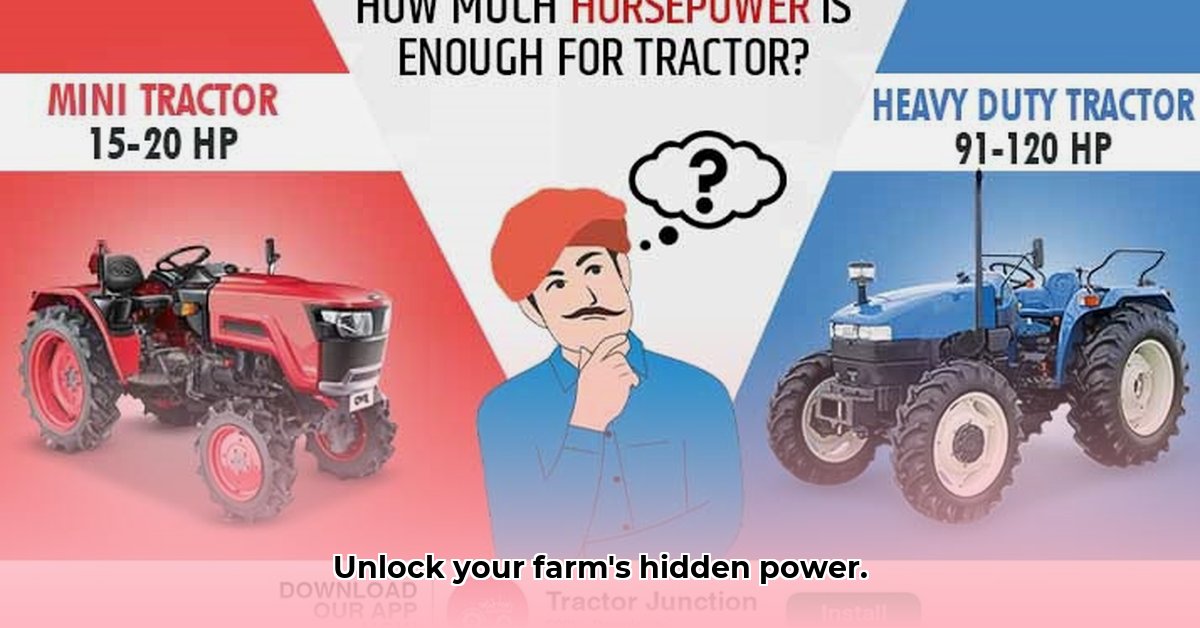
Choosing the right tractor horsepower is crucial for efficient and sustainable farming. This guide helps you determine the optimal horsepower for your specific needs, considering factors beyond just farm size. We'll explore how soil type, farming practices, and even new technologies influence your decision-making process, ensuring you select a tractor that maximizes productivity while minimizing environmental impact and long-term costs. For more details on specific models, check out this helpful resource on tractor horsepower.
Understanding Horsepower Needs for Your Tractor
Horsepower (HP) determines your tractor's power output. More horsepower means more capacity for demanding tasks like plowing heavy clay soils or pulling large implements. However, selecting a higher horsepower than necessary leads to increased fuel consumption and unnecessary expenses. Several key factors influence your horsepower requirement:
Key Factors Affecting Horsepower Requirements
- Soil Type: Heavy clay soils require significantly more horsepower than lighter, sandy soils. Think of it like pushing a wheelbarrow through mud versus sand – the mud demands far more effort.
- Farming Practices: No-till farming generally requires less horsepower than conventional tillage, as it avoids the energy-intensive process of plowing.
- Implement Size: Larger implements (plows, harrows, planters) naturally demand more horsepower to operate effectively.
- Terrain: Hilly or sloped terrain increases the horsepower needed for both traction and maneuverability. Your tractor has to work harder to climb hills and prevent slippage.
- Operational Intensity: Frequent and intensive use necessitates a more powerful and robust tractor than one used sparingly.
- Future Planning: Consider potential farm expansion and increased workload when making your selection. A more powerful tractor might save you money in the long run if you anticipate increasing your operations.
While a formula exists for calculating horsepower – HP = (Torque x RPM) / 5252 – it's more relevant for engineers. A practical approach, focusing on the factors above, provides a more realistic assessment of your needs.
Matching Horsepower to Specific Farm Tasks
The appropriate horsepower varies considerably depending on the tasks you perform. Overpowering is as inefficient as underpowering.
| Tractor Type | Horsepower Range | Typical Tasks |
|---|---|---|
| Sub-compact Tractor | 20-30 HP | Mowing lawns, small gardens, light landscaping |
| Compact Utility Tractor | 30-50 HP | Hay baling (small scale), tilling smaller fields |
| Utility Tractor | 50-100 HP | Plowing, planting, harvesting (medium scale) |
| High-Horsepower Tractor | 100+ HP | Large-scale farming operations, heavy tillage |
Don't overlook torque, the twisting force that moves heavy loads. A lower-horsepower tractor with high torque can outperform a higher-horsepower tractor with low torque in challenging conditions like muddy fields or steep slopes. It's like having a strong but compact engine – great for pulling heavy loads, even if it doesn't boast high speed. Isn't it surprising how much a seemingly simple concept like torque can influence your decision?
Fuel Efficiency and Environmental Impact: A Sustainable Approach
Fuel costs are a major concern. Higher horsepower typically means higher fuel consumption. However, modern engine technology is improving fuel efficiency. Let's examine the trade-offs:
Advantages of Higher Horsepower (with efficient engines):
- Increased Productivity: Faster task completion, maximizing your workday. How much time would you save, and what could you accomplish with that extra time?
- Versatility: Ability to handle a wider range of implements and tasks.
Disadvantages of Higher Horsepower:
- Higher Fuel Costs: A significant impact on your operational budget. What percentage of your budget currently goes to fuel costs?
- Greater Environmental Impact: Increased carbon footprint due to higher fuel consumption.
Strategies for Enhanced Efficiency:
- Modern Engines: Look for tractors with fuel-efficient engines – manufacturers are constantly developing more environmentally friendly designs.
- Precision Agriculture: Technologies like GPS guidance minimize overlap, saving fuel and reducing environmental impact. Did you know that using a GPS system can reduce fuel consumption by as much as 15%?
- Variable Rate Application: Adjusting fertilizer or pesticide application based on specific field needs optimizes resource use and minimizes waste.
Precision Agriculture and Horsepower Optimization
Precision agriculture technologies are crucial for optimizing horsepower utilization and minimizing waste. GPS guidance systems significantly reduce fuel consumption by preventing overlapping passes. Variable rate application further enhances efficiency by tailoring fertilizer and pesticide application to the specific needs of your field. What is the single most effective technology you can invest in to improve efficiency?
Selecting the Right Tractor: A Comprehensive Guide
Choosing a tractor is a substantial investment. Follow these steps:
- Analyze Your Farm Operation: List all tasks and estimate time spent on each.
- Assess Power Needs: Determine horsepower required for each task based on the factors discussed earlier.
- Set a Realistic Budget: Factor in purchase price, fuel, maintenance, and resale value.
- Compare Models: Research different models, focusing on fuel efficiency, torque, and efficiency-boosting features.
- Seek Expert Advice: Consult with experienced dealers for personalized guidance.
Long-Term Considerations: Sustainability and Beyond
The initial cost is not the only factor to consider. Think about:
- Fuel Efficiency: A more fuel-efficient tractor can save thousands over its lifespan.
- Maintenance Costs: Regular maintenance is vital for maximizing the life of your tractor.
- Resale Value: Consider the resale value of different tractor models.
Choosing the right tractor is an investment in the sustainability and long-term viability of your farm. The optimal horsepower isn't a generic answer – it's a solution tailored to your specific needs and values.